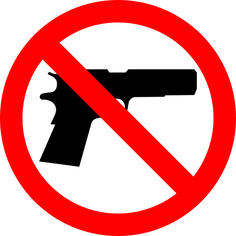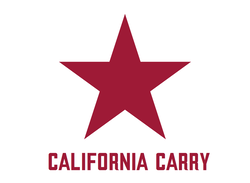YOU ARE RESPONSIBLE FOR YOUR OWN SAFETY. GUN FREE ZONES WITHOUT SERIOUS SECURITY SCREENING ARE WORTHLESS. LAWS AND SIGNS CANNOT PROTECT YOU. YOU MAY CHOOSE TO CARRY ANYWAY, BUT YOU DO AT YOUR OWN (LEGAL) RISK.
Highlights
- Licensees are bound by the terms of their licenses, which may include a condition banning carry on some types of private property and/or buildings posted “no firearms.”
- There is no state law prohibiting carry past “no guns” signs on private property.
- There is no law protecting you from legally carrying a gun at work; you can be fired if you violate your employer’s weapons policy.
- A friend may allow you to openly carry at their business.
- Private schools are included in 626.9, the Gun Free School Zones Act.
Fenced and posted private property
602(l)(4). Entering any lands under cultivation or enclosed by fence, belonging to, or occupied by, another, or entering upon uncultivated or unenclosed lands where signs forbidding trespass are displayed at intervals not less than three to the mile along all exterior boundaries and at all roads and trails entering the lands without the written permission of the owner of the land, the owner’s agent, or the person in lawful possession, and any of the following:
[(1)-(3) omitted]
(4) Discharging any firearm.
Legal to carry concealed at one’s home, business, or private property
25605. (a) Section 25400 and Chapter 6 (commencing with Section 26350) of Division 5 shall not apply to or affect any citizen of the United States or legal resident over the age of 18 years who resides or is temporarily within this state, and who is not within the excepted classes prescribed by Chapter 2 (commencing with Section 29800) or Chapter 3 (commencing with Section 29900) of Division 9 of this title, or Section 8100 or 8103 of the Welfare and Institutions Code, who carries, either openly or concealed, anywhere within the citizen’s or legal resident’s place of residence, place of business, or on private property owned or lawfully possessed by the citizen or legal resident, any handgun.
(b) No permit or license to purchase, own, possess, keep, or carry, either openly or concealed, shall be required of any citizen of the United States or legal resident over the age of 18 years who resides or is temporarily within this state, and who is not within the excepted classes [prohibited persons; text omitted], to purchase, own, possess, keep, or carry, either openly or concealed, a handgun within the citizen’s or legal resident’s place of residence, place of business, or on private property owned or lawfully possessed by the citizen or legal resident.
(c) Nothing in this section shall be construed as affecting the application of Sections 25850 to 26055 [loaded open carry], inclusive.
This section was changed to allow in 1989 in response to: People v. Melton (1988) 206 Cal. App. 3d 580, 253 Cal. Rptr. 661.
Note: a person who grants permission to carry must have “possessory interest” in the location. In People v. Barela [(1991) - 234 Cal. App. 3d Supp. 15, 286 Cal. Rptr. 458.], assistant managers gave a man permission to carry a concealed firearm to act as an unlicensed security guard where the general manager said the assistant managers did not have that authority.
Note: a person who grants permission to carry must have “possessory interest” in the location. In People v. Barela [(1991) - 234 Cal. App. 3d Supp. 15, 286 Cal. Rptr. 458.], assistant managers gave a man permission to carry a concealed firearm to act as an unlicensed security guard where the general manager said the assistant managers did not have that authority.
The legislative statement of purpose makes clear that an employee must have a possessory interest in his or her workplace in order for that workplace to be considered the employee's ‘place of business’ under section 12026. Only those employees who have the right to exclude others from their workplace, and the right to control activities there, may carry concealed weapons at work without a permit or license.
Vehicles are tricky. A taxi was found to be a “place of business” in People v. Marotta [(1981) - 128 Cal. App. 3d Supp. 1, 180 Cal. Rptr. 611.], while in People v. Wooten [(1985) 168 Cal. App. 3d 158, 214 Cal. Rptr. 40.] this did not apply to a pickup truck because the driver was sometimes a “bounty hunter.” The opinion in Marotta made several good points, but the justices suggested a legislative fix, so one who operates a business out of their vehicle should not rely on this decision.
Business, private property, and employee loaded handgun (open carry) exemption
Business, private property, and employee loaded handgun (open carry) exemption
26035. Nothing in Section 25850 shall prevent any person engaged in any lawful business, including a nonprofit organization, or any officer, employee, or agent authorized by that person for lawful purposes connected with that business, from having a loaded firearm within the person’s place of business, or any person in lawful possession of private property from having a loaded firearm on that property.
Other
Note: these appear to be restrictions on the facility, not licensed concealed carriers. Use caution. At a minimum, refusal to disarm or leave could be a trespassing offense.
- Child care facilities 22 CCR § 101238(g)(2)
- Rehab facilities 22 CCR § 81087(m)
- Crisis nurseries 22 CCR § 86587(g)(4)

Note: generally, concealed carry is definitely allowed on private property for the owner. Barela seems to imply only high-level managers are allowed to carry concealed under 25605, whereas 26035 allows employees and agents to carry at the business. 26035 requires that carrying be done “for lawful purposes connected with that business.” It would be legal for a business owner to allow his employees to openly carry.
Can I carry at work?
Unless some other law (i.e. school employee) or condition applies, there is no law preventing you from carrying a firearm at your place of business or employment. However, many employers have “no weapons” policies and can fire you. There is no special protection for licensees or for firearms safely locked in parked vehicles.
Can I carry on private property?
Yes, unless some other law or condition applies. Some counties (Sacramento in particular) are strict about this requirement for their licensees.
Can I carry past a “no guns” sign on private property?
Yes, unless some other law or condition applies. If you fail to leave or disarm when asked by someone in charge, you can be charged with trespassing.
Can I carry past a metal detector?
Yes, unless there is some other law preventing you from having a firearm in that place. Usually, if there are metal detectors the place will not let licensees carry past them regardless of the law.
Carry I openly carry at my buddy’s business?
Yes, if he allows you to for some reason connected to the business (“for lawful purposes connected with that business”); i.e. you’re helping out there.
Can I carry at work?
Unless some other law (i.e. school employee) or condition applies, there is no law preventing you from carrying a firearm at your place of business or employment. However, many employers have “no weapons” policies and can fire you. There is no special protection for licensees or for firearms safely locked in parked vehicles.
Can I carry on private property?
Yes, unless some other law or condition applies. Some counties (Sacramento in particular) are strict about this requirement for their licensees.
Can I carry past a “no guns” sign on private property?
Yes, unless some other law or condition applies. If you fail to leave or disarm when asked by someone in charge, you can be charged with trespassing.
Can I carry past a metal detector?
Yes, unless there is some other law preventing you from having a firearm in that place. Usually, if there are metal detectors the place will not let licensees carry past them regardless of the law.
Carry I openly carry at my buddy’s business?
Yes, if he allows you to for some reason connected to the business (“for lawful purposes connected with that business”); i.e. you’re helping out there.
